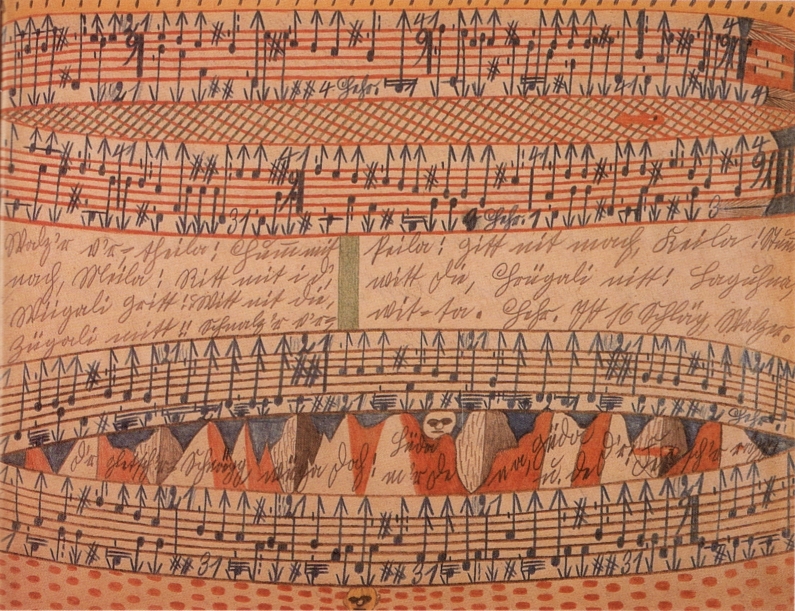Adolf Wölfli, Untitled, 1913
Is it an effect of the times that music writing is so little celebrated, or is it the result of a science too complex and cryptic to be displayed in public? Is it the difficulty of a creative discipline to be heard in the midst of a world of production, or the failure of composers to transmit and promote their art?
Western music, whether we call it classical, contemporary or scholarly, is born of the meeting of two realities: the written symbol on the one hand, and the sound phenomenon on the other – a mixture of the ephemeral and the perennial, the sensational and the premeditated. The composer’s job is not only to write down the sounds that pass through his head, but also to project the result of what he has written. The work of the performers, in turn, allows as many people as possible to hear a possible realization of the score. In this way, musical notation is not only a means of preserving and transmitting music, it is also a means and an arena for invention.
Of course, creative activities always seem a little obscure, sometimes even to those who practice them; but none is as little celebrated as musical composition, despite the mythical, almost mythological figures of past centuries – Beethoven, his solitude and deafness in the first instance. Music writing is seen as a laborious science or, on the contrary, as an exotic metaphysical practice; it is unfairly criticized for producing dogmatic music that is out of touch with the times and requires painful initiation.
Indeed, while composers explore new territories of reason and sensibility, it seems that the age – or perhaps civilization as a whole – is less concerned with creation than with production. During the twentieth century in particular, technology largely favored one aspect of music: that of instantaneous performance and identical reproducibility. Sound production techniques have overtaken writing techniques, a speed that the labor of composition ignores. In little more than half a century, sound recording has pulverized the economic position of musical writing, further marginalizing the composer in society.
At the same time, music from mainly oral traditions has benefited from this development, becoming omnipresent in our daily lives and enjoying a much more comfortable socio-economic base. Amplified and broadcast on a massive scale, they travel the world in their definitive form, even when distorted by recording, radio or bad amateurs, and thus saturate our acoustic environment. By comparison, written music is not disengaged from its time, but its relationship to it is more complex. Their singularity always requires the help of some kind of mediation, some kind of will, even if it’s an individual one, if it is to be durably integrated into existing social structures. For Stravinsky to survive, for Mahler to be rediscovered and, even more so, for new-generation composers to be heard, funding and distribution resources are needed.
Against this backdrop, musical writing finds little resonance with the general public. Perhaps musicians themselves are sometimes guilty, through too much academic arrogance, of not having been able to assert their art; perhaps some have, through a reflex of withdrawal or a spirit of contradiction, abandoned the sound result in favor of writing theories alone, for which no audience can be the recipient. But the avant-garde naturally remains the place for musical writing, whether or not you claim to be part of it. The fact of composing as much in writing as in sound is, in essence, a speculation that unquestionably differentiates written music from clichés and other facilities stemming from more immediate traditions.
So, it’s not just the musical avant-garde that civilization fails to praise more, it’s also the taste for novelty, curiosity and, incidentally, risk-taking. What written music does, and has always done, is to go beyond the repetition of a fashion to extend its own field of action beyond the provisional. Without writing, radio stations would have no song to offer other than “J’ai du bon tabac”, and we’d spend our time “recognizing” sounds instead of hearing them.
It is the interaction of writing and sound that drives musical radicalism, but also makes the composer’s position so fragile. With modern times preferring market speculation to intellectual speculation, the plastic arts, more material by nature, are doing better than ever. As for composers, they usually find refuge in academic positions or highly marginal social circuits. In contrast to certain self-proclaimed underground arts, musical writing is reluctantly relegated to the shadows, but continues to preside over the sonic metamorphoses of humanity. And so little is said about it!

